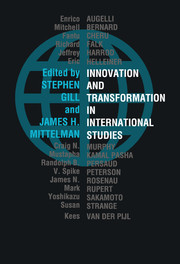Book contents
- Frontmatter
- Contents
- List of contributors
- Preface
- Acknowledgements
- Part I Rethinking and remaking the roots of global social and political theory
- 1 Transformation and innovation in the study of world order
- 2 Consciousness, myth and collective action: Gramsci, Sorel and the ethical state
- 3 The critical realist tradition and the demystification of interstate power: E. H. Carr, Hedley Bull and Robert W. Cox
- 4 Ibn Khaldun and world order
- Part II Political economy: the social and ecological anatomy of transformation
- Part III Transformation, innovation and emancipation in global political and civil society
- Part IV Reflections on global order in the twenty-first century
- References
- Index of names
- Index of subjects
3 - The critical realist tradition and the demystification of interstate power: E. H. Carr, Hedley Bull and Robert W. Cox
Published online by Cambridge University Press: 05 July 2011
- Frontmatter
- Contents
- List of contributors
- Preface
- Acknowledgements
- Part I Rethinking and remaking the roots of global social and political theory
- 1 Transformation and innovation in the study of world order
- 2 Consciousness, myth and collective action: Gramsci, Sorel and the ethical state
- 3 The critical realist tradition and the demystification of interstate power: E. H. Carr, Hedley Bull and Robert W. Cox
- 4 Ibn Khaldun and world order
- Part II Political economy: the social and ecological anatomy of transformation
- Part III Transformation, innovation and emancipation in global political and civil society
- Part IV Reflections on global order in the twenty-first century
- References
- Index of names
- Index of subjects
Summary
American-centred efforts in International Relations theorising during the last several decades have struggled hard to discipline academic inquiry and understanding by a reductive, totalising focus on the power relations among sovereign states. In a certain sense, this neo-realist orthodoxy can be treated as nothing more or less than a geopolitical snapshot of the Cold War period. Even this restricted image of the subject matter of International Relations invites a serious misinterpretation of recent world history, making the present preoccupation with the dynamics of the world economy seem overly discontinuous from the past, and providing little, if any, insight into the various stages in the complex interplay between state and market that are so characteristic of this emergent era of globalisation.
Within the broad domain of realist thinking, that is, analysis grounded on an assessment of the realities of power in all forms of international life, there exists a counter-tradition that is more historically and philosophically oriented. This tradition accords priority to the dynamic diversity of political arrangements, spatially and temporally, offering overall lines of interpretation of a given world order rather than positivistic hypotheses about statist behaviour that are analytic and scientifically rigorous, constructs, purportedly true or false independent of time and place. Critical realism, by its stress on context, thus contrasts with neo-realism even taking full account of the range of orientations encompassed by the latter (Gilpin, 1986).
- Type
- Chapter
- Information
- Innovation and Transformation in International Studies , pp. 39 - 55Publisher: Cambridge University PressPrint publication year: 1997
- 10
- Cited by



